被动语态特殊用法讲解和练习(无答案)
中考英语中被动语态特殊情况(中考英语被动语态讲解)
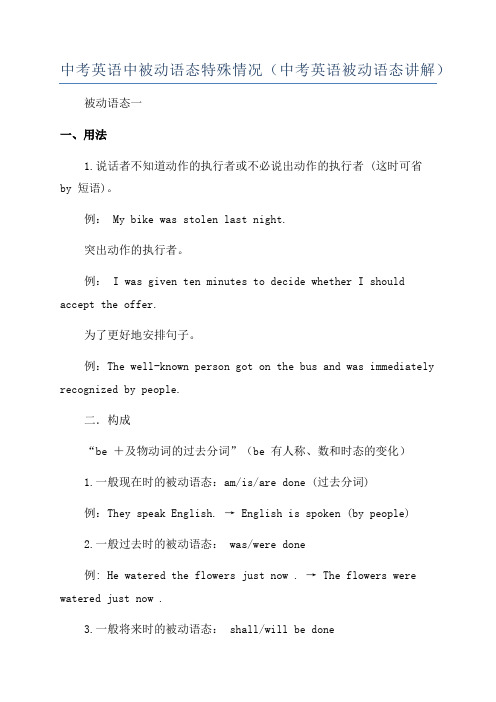
中考英语中被动语态特殊情况(中考英语被动语态讲解)被动语态一一、用法1.说话者不知道动作的执行者或不必说出动作的执行者 (这时可省by 短语)。
例: My bike was stolen last night.突出动作的执行者。
例: I was given ten minutes to decide whether I shouldaccept the offer.为了更好地安排句子。
例:The well-known person got on the bus and was immediately recognized by people.二.构成“be +及物动词的过去分词”(be 有人称、数和时态的变化)1.一般现在时的被动语态:am/is/are done (过去分词)例:They speak English. → English is spoken (by people)2.一般过去时的被动语态: was/were done例: He watered the flowers just now . → The flowers were watered just now .3.一般将来时的被动语态: shall/will be done例:We will clean the classroom. → The classroom will be cleaned (by us ) .4.现在进行时的被动语态:am/is /are being done例:Tom is picking apples . → Apples are being picking by Tom5.过去进行时的被动语态 was/were being done6.现在完成时的被动语态: has /have been done例; The workers have built a house. → A house has beenbuilt by the workers .7.过去完成时的被动语态:had been done8.过去将来时的被动语态:should/would be done例:You would look after him well . → He would be looked after well .9.情态动词的被动语态:情态动词+be+过去分词例:The baby should be taken good care of by the baby-sitter.三.步骤主动语态变被动语态1、找:找主语、找宾语(找原主动句中的主语和宾语)2、换:换位置,主语变宾语,宾语变主语3、改:动词改成be done的被动形式(其人称和数随主语变化,动词时态则保持不变)4、加:加by( 宾格),加附属(定语、状语),by 宾格可省略。
(完整版)被动语态的几种特殊用法
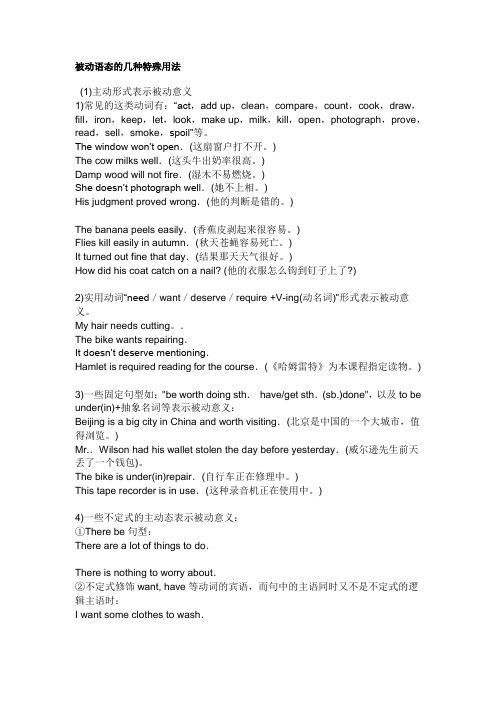
被动语态的几种特殊用法(1)主动形式表示被动意义1)常见的这类动词有:“act,add up,clean,compare,count,cook,draw,fill,iron,keep,let,look,make up,milk,kill,open,photograph,prove,read,sell,smoke,spoil”等。
The window won’t open.(这扇窗户打不开。
)The cow milks well.(这头牛出奶率很高。
)Damp wood will not fire.(湿木不易燃烧。
)She doesn’t photograph well.(她不上相。
)His judgment proved wrong.(他的判断是错的。
)The banana peels easily.(香蕉皮剥起来很容易。
)Flies kill easily in autumn.(秋天苍蝇容易死亡。
)It turned out fine that day.(结果那天天气很好。
)How did his coat catch on a nail? (他的衣服怎么钩到钉子上了?)2)实用动词“need/want/deserve/require +V-ing(动名词)”形式表示被动意义。
My hair needs cutting。
.The bike wants repairing.It doesn’t deserve mentioning.Hamlet is required reading for the course.(《哈姆雷特》为本课程指定读物。
)3)一些固定句型如:"be worth doing sth.have/get sth.(sb.)done",以及to be under(in)+抽象名词等表示被动意义:Beijing is a big city in China and worth visiting.(北京是中国的一个大城市,值得浏览。
2021九年级英语专题训练-被动语态学案(无答案)
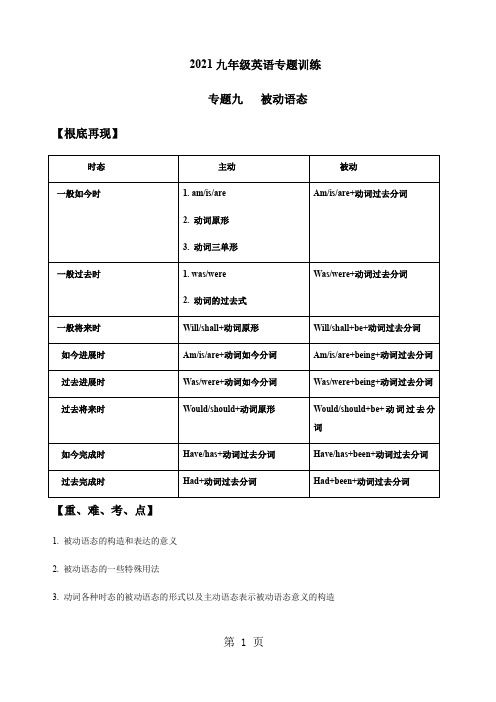
2021九年级英语专题训练专题九被动语态【根底再现】【重、难、考、点】1. 被动语态的构造和表达的意义2. 被动语态的一些特殊用法3. 动词各种时态的被动语态的形式以及主动语态表示被动语态意义的构造【教学内容】一、被动语态的用法1. 不知道动作的执行者是谁。
如:This watch is made in China.2. 没有必要指出动作的执行者是谁More trees must be planted every year.3. 需要强调或者突出动作的承受者时Chinese is spoken by more and more people in the world.4. 句子的主语不是人Many buses were washed away by the flood.二、 主动语态变为被动语态We Visited that factory last summer →主动语态last summer →被动语态主语 谓语 宾语 状语三、带双宾的谓语动词变为被动语态有些动词带有两个宾语,即直接宾语和间接宾语,变被动语态时,可把其中一个宾语变成主语,另一个留在被动构造谓语后面。
需要注意的是:假设把直接宾语变成被动语态的主语,需要在间接宾语之间加上介词“to 〞。
eg. He often tells us interesting stories . 〔主动语态〕⎭⎬⎫.him by us to told often are stories g Interestin .him by stories g interestin told often are We 〔被动语态〕常带双宾语的词有:tell , show , lend , pass等。
四、带复合宾语的动词变为被动语态在主动语态中,某些动词之后带有复合宾语,即宾语和宾语补足语,这个复合宾语由动词不定式来充当,to被省略,但在被动语态中,这个to还要复原。
初中英语被动语态讲解及练习
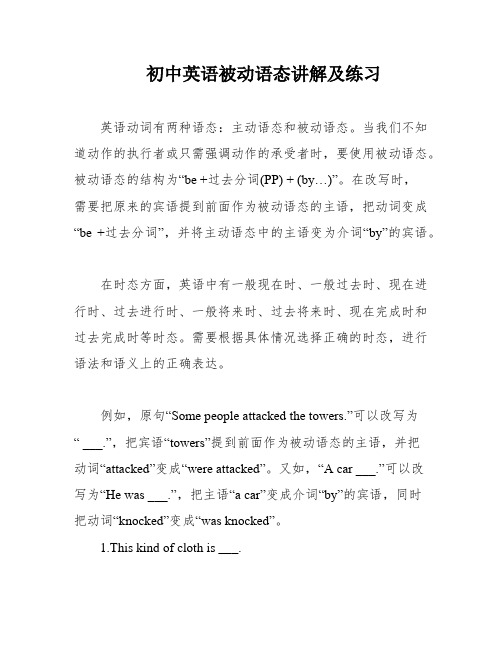
初中英语被动语态讲解及练习英语动词有两种语态:主动语态和被动语态。
当我们不知道动作的执行者或只需强调动作的承受者时,要使用被动语态。
被动语态的结构为“be +过去分词(PP) + (by…)”。
在改写时,需要把原来的宾语提到前面作为被动语态的主语,把动词变成“be +过去分词”,并将主动语态中的主语变为介词“by”的宾语。
在时态方面,英语中有一般现在时、一般过去时、现在进行时、过去进行时、一般将来时、过去将来时、现在完成时和过去完成时等时态。
需要根据具体情况选择正确的时态,进行语法和语义上的正确表达。
例如,原句“Some people attacked the towers.”可以改写为“ ___.”,把宾语“towers”提到前面作为被动语态的主语,并把动词“attacked”变成“were attacked”。
又如,“A car ___.”可以改写为“He was ___.”,把主语“a car”变成介词“by”的宾语,同时把动词“knocked”变成“was knocked”。
1.This kind of cloth is ___.2.When the infinitive is used as an adverb after certain adjectives and has a direct object。
it takes the active form to express passive meaning.Examples:The fish is not fit to eat.We find English hard to learn.The article is difficult to understand.3.When the infinitive is used as a postpositive attributive。
it takes the active form to express passive meaning.Examples:I have a lot of homework to do.I'll give him some books to read.4.When a ___ a state or n。
(全面版)初中被动语态解析与练习

全面版)初中被动语态解析与练习一、被动语态的概念被动语态是英语中的一种动词形式,用于表示主语是动作的承受者而非执行者的句子。
其结构为:be动词] + [及物动词的过去分词]如:am/is/are/was/were/been + 过去分词)被动语态可以强调动作的接受者,不关注动作的执行者。
在写作中,使用被动语态可以增加句子的变化和丰富性。
二、被动语态的用法1.表示动作的接受者被动语态常用于强调主语是动作的接受者。
例如。
主动语态:___.被动语态:I was ___.2.隐藏动作的执行者当执行者无关紧要或不需要强调时,被动语态可以隐藏动作的执行者。
例如:主动语态:___.被动语态:A ___ was built last month.3.客观事实陈述被动语态常用于客观陈述事实,不强调执行者或承受者。
例如:主动语态:People speak English all over the world.被动语态:English is spoken all over the world.三、被动语态的变化规则和注意事项被动语态的变化规则如下:一般现在时:am/is/are + 过去分词一般过去时:was/were + 过去分词一般将来时:will be + 过去分词现在进行时:am/is/are being + 过去分词需要注意的是:当主动句中有宾格时,被动句需要使用介词"by"来表示动作的执行者。
例如:The book ___.一些特殊动词以及某些及物动词不适用被动语态,需要注意区分。
四、被动语态的练习请将下列句子转换为被动语态:1.They have built a new bridge in the city.2.She will write a letter to her ___.3.___.4.We can solve this problem easily.5.___.参考答案:1.A new bridge has been built in the city.2.___ will be written to her mother by her.3.___ to the students by the ___.4.This problem can be solved easily.5.I ___.以上是被动语态的解析和练习内容,希望能帮助你更好地理解和运用被动语态。
(完整)高中英语被动语态讲解与练习.doc

高中英语被动语态总结一、被动语态的构成形式1.被动语态的基本时态变化被动语态通常为十种时态的被动形式,被动语态由be+过去分词构成, be 随时态的变化而变化。
以do 为例,各种时态的被动语态形式为:1)am/is/are +done ( 过去分词 ) 一般现在时2 ) has /have been done现在完成时3) am/is /are being done现在进行时4) was/were done一般过去时5) had been done过去完成时6) was/were being done过去进行时7) shall/will be done一般将来时8) should/would be done过去将来时9) shall/will have been done将来完成时(少用)10) should/would have been done过去将来完成时(少用)2.被动语态的特殊结构形式1)带情态动词的被动结构。
其形式为:情态动词+ be+过去分词。
例The baby should be taken good care of by the baby-sitter.2)有些动词可以有两个宾语,在用于被动结构时,可以把主动结构中的一个宾语变为主语,另一宾语仍然保留在谓语后面。
通常变为主语的是间接宾语。
例 His mother gave him a present for his birthday. 可改为 He was given a present by his motherfor his birthday.3)当“动词 +宾语 +宾语补足语”结构变为被动语态时,将宾语变为被动结构中的主语,其余不动。
例 Someonecaught the boy smoking a cigarette.可改为The boy was caught smoking a cigarette.4)在使役动词have, make, get以及感官动词see, watch, notice, hear, feel, observe等后面不定式作宾语补语时,在主动结构中不定式to 要省略,但变为被动结构时,要加to 。
被动语态语法精讲及练习

被动语态语法精讲及练习英语动词有两种语态,即主动语态(The Active Voice)和被动语态(The Passive Voice)。
主动语态表示主语是动作的执行者,被动语态表示主语是动作的承受者,例如:Many people speak English . (主动语态)English is spoken by many people. (被动语态)基本形式:be +ved(及物动词的过去分词)被动语态的用法:1)当我们不知道谁是动作的执行者,或者没有必要指出谁是动作的执行者时,或者只需强调动作的承受者时,要用被动语态。
This jacket is made of cotton.English is spoken in many countries in the world.2) 强调动作的承受者时。
The boy was saved at last. 这个男孩最后得救了。
一、主动语态变被动语态的步骤:主动句: The boy broke the window yesterday.被动句: The window was broken by the boy yesterday.步骤一:原句中的宾语the window变成主语。
步骤二:谓语动词broke改为被动形式:was broken步骤三:原句中的主语The boy放在介词by的后面。
步骤四:其他成分如:yesterday不变。
口诀:宾变主,主变宾,谓语动词be+V.pp二、主动语态变被动语态的时态的变化:各种时态的主动语态和被动语态谓语结构对照表时态主动语态被动语态be+V.pp1 一般现在时do/does am/is/are+过去分词2 一般过去时Did was/were+过去分词3 含情态动词情态动词+动词原形情态动词+be+过去分词4 一般将来时will/be going to+动词原形will/be going to+be+过去分词5 过去将来时would+动词原形would+be+过去分词6 现在进行时am/is/are+现在分词am/is/are+being+过去分词7 过去进行时was/were+现在分词Was/were+being+过去分词8 现在完成时have/has+过去分词have/has+been+过去分词9 过去完成时had+过去分词had been+过去分词注:中考一般只考一般现在时,一般过去时,一般将来时,现在完成时以及情态动词的被动语态,其余只作拓展学习。
被动语态的用法及例句

被动语态的用法及例句一、引言被动语态是英语中非常重要且常用的一种语法结构。
掌握被动语态的用法和书写方式,对提高我们的英语写作能力至关重要。
本文将详细介绍被动语态的定义、形式和基本结构,并提供一些具体的例句来帮助读者更好地理解和运用被动语态。
二、被动语态的定义在英语中,当主语是执行某个动作的对象而不是执行者时,我们就可以使用被动语态。
通过使用被动语态,我们可以聚焦于行为或事件所产生的影响,而不需要强调执行动作的人或物。
三、被动语态的形式要构造一个被动句子,我们需要使用助动词"be"加上过去分词形式(通常以-ed 或-en结尾)。
具体而言,根据时态和情景,"be" 的形式可以是"is"、"am"、"are"(现在时)、"was"、"were"(过去时)等。
四、基本结构1. 现在时:[be (is/am/are)] + [过去分词]2. 过去时:[be (was/were)] + [过去分词]3. 将来时:[will be] + [过去分词]4. 现在完成时:[have/has been] + [过去分词]五、例句下面是一些例句,展示了被动语态在不同情景下的正确应用。
1. 现在时:- 主动语态: He writes letters.- 被动语态: Letters are written by him.2. 过去时:- 主动语态: She repaired the car.- 被动语态: The car was repaired by her.3. 将来时:- 主动语态: They will finish the project next week.- 被动语态: The project will be finished by them next week.4. 现在完成时:- 主动语态: We have completed the task.- 被动语态: The task has been completed by us.六、被动语态的用途1. 强调行为承受者而非执行者:被动语态可以将行为的接收者置于主要焦点。
被动语态英语讲解与习题
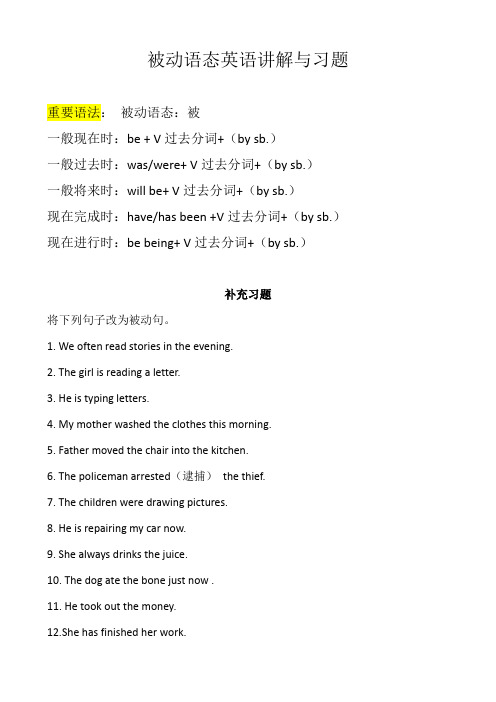
被动语态英语讲解与习题重要语法:被动语态:被一般现在时:be + V过去分词+(by sb.)一般过去时:was/were+ V过去分词+(by sb.)一般将来时:will be+ V过去分词+(by sb.)现在完成时:have/has been +V过去分词+(by sb.)现在进行时:be being+ V过去分词+(by sb.)补充习题将下列句子改为被动句。
1. We often read stories in the evening.2. The girl is reading a letter.3. He is typing letters.4. My mother washed the clothes this morning.5. Father moved the chair into the kitchen.6. The policeman arrested(逮捕)the thief.7. The children were drawing pictures.8. He is repairing my car now.9. She always drinks the juice.10. The dog ate the bone just now .11. He took out the money.12.She has finished her work.13.S he bought a new pen yesterday.14.I will do my homework the day after tomorrow.15.W e call it a clavichord.16.He broke the glass.17.He has punished(惩罚) the boy.。
(完整版)被动语态的几种特殊用法
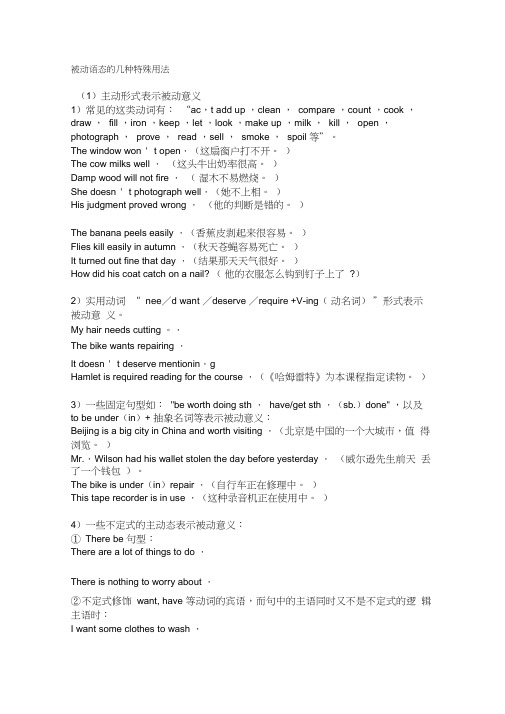
被动语态的几种特殊用法(1)主动形式表示被动意义1)常见的这类动词有:“ac,t add up ,clean ,compare ,count ,cook ,draw ,fill ,iron ,keep ,let ,look ,make up ,milk ,kill ,open ,photograph ,prove ,read ,sell ,smoke ,spoil 等”。
The window won ' t open.(这扇窗户打不开。
)The cow milks well .(这头牛出奶率很高。
)Damp wood will not fire .(湿木不易燃烧。
)She doesn ' t photograph well.(她不上相。
)His judgment proved wrong .(他的判断是错的。
)The banana peels easily .(香蕉皮剥起来很容易。
)Flies kill easily in autumn .(秋天苍蝇容易死亡。
)It turned out fine that day .(结果那天天气很好。
)How did his coat catch on a nail? (他的衣服怎么钩到钉子上了?)2)实用动词“ nee/d want /deserve /require +V-ing(动名词)”形式表示被动意义。
My hair needs cutting 。
.The bike wants repairing .It doesn ' t deserve mentionin.gHamlet is required reading for the course .(《哈姆雷特》为本课程指定读物。
)3)一些固定句型如:"be worth doing sth .have/get sth .(sb.)done" ,以及to be under(in)+ 抽象名词等表示被动意义:Beijing is a big city in China and worth visiting .(北京是中国的一个大城市,值得浏览。
【专项训练】被动语态的几种特殊用法及被动语态练习
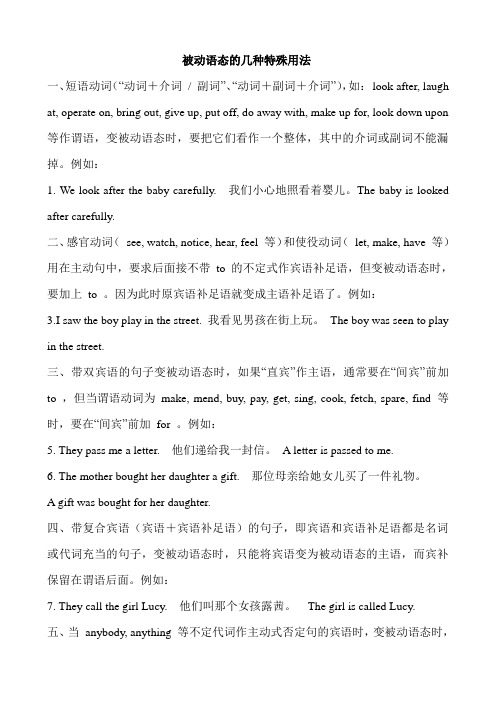
被动语态的几种特殊用法一、短语动词(“动词+介词/ 副词”、“动词+副词+介词”),如:look after, laugh at, operate on, bring out, give up, put off, do away with, make up for, look down upon 等作谓语,变被动语态时,要把它们看作一个整体,其中的介词或副词不能漏掉。
例如:1. We look after the baby carefully. 我们小心地照看着婴儿。
The baby is looked after carefully.二、感官动词(see, watch, notice, hear, feel 等)和使役动词(let, make, have 等)用在主动句中,要求后面接不带to 的不定式作宾语补足语,但变被动语态时,要加上to 。
因为此时原宾语补足语就变成主语补足语了。
例如:3.I saw the boy play in the street. 我看见男孩在街上玩。
The boy was seen to play in the street.三、带双宾语的句子变被动语态时,如果“直宾”作主语,通常要在“间宾”前加to ,但当谓语动词为make, mend, buy, pay, get, sing, cook, fetch, spare, find 等时,要在“间宾”前加for 。
例如:5. They pass me a letter. 他们递给我一封信。
A letter is passed to me.6. The mother bought her daughter a gift. 那位母亲给她女儿买了一件礼物。
A gift was bought for her daughter.四、带复合宾语(宾语+宾语补足语)的句子,即宾语和宾语补足语都是名词或代词充当的句子,变被动语态时,只能将宾语变为被动语态的主语,而宾补保留在谓语后面。
高中英语被动语态讲解及练习
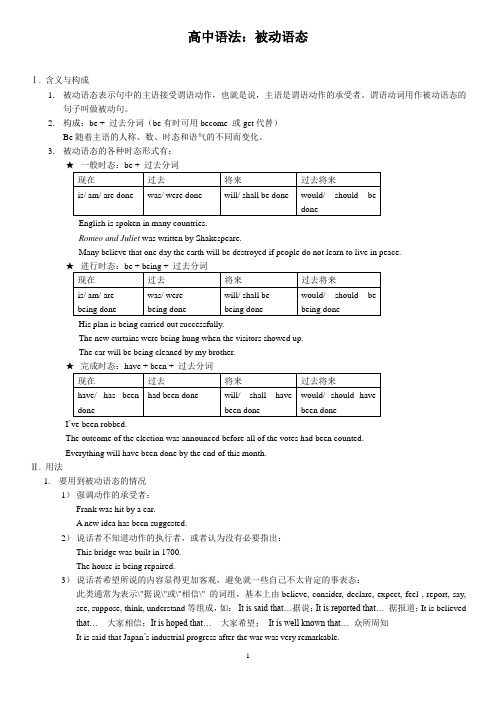
高中语法:被动语态Ⅰ. 含义与构成1.被动语态表示句中的主语接受谓语动作,也就是说,主语是谓语动作的承受者。
谓语动词用作被动语态的句子叫做被动句。
2.构成:be + 过去分词(be有时可用become 或get代替)Be随着主语的人称、数、时态和语气的不同而变化。
3.被动语态的各种时态形式有:English is spoken in many countries.Romeo and Juliet was written by Shakespeare.Many believe that one day the earth will be destroyed if people do not learn to live in peace.His plan is being carried out successfully.The new curtains were being hung when the visitors showed up.The car will be being cleaned by my brother.I’ve been robbed.The outcome of the election was announced before all of the votes had been counted.Everything will have been done by the end of this month.Ⅱ. 用法1.要用到被动语态的情况1)强调动作的承受者:Frank was hit by a car.A new idea has been suggested.2)说话者不知道动作的执行者,或者认为没有必要指出:This bridge was built in 1700.The house is being repaired.3)说话者希望所说的内容显得更加客观,避免就一些自己不太肯定的事表态:此类通常为表示\"据说\"或\"相信\" 的词组,基本上由believe, consider, declare, expect, feel , report, say,see, suppose, think, understand等组成,如:It is said that…据说;It is reported that… 据报道;It is believedthat…大家相信;It is hoped that…大家希望;It is well known that… 众所周知It is said that Japan’s industrial progress after the war was very remarkable.4)在文章标题、广告、新闻中Waitress wanted.Millions of pounds’ worth of damage has been caused by a storm which swept across the north of England last night.2.感官动词主动语态的宾语补足语是不带to 的不定式,变为被动语态时,该不定式前要加"to":The teacher made me go out of the classroom.--> I was made to go out of the classroom (by the teacher).We saw him play football on the playground.--> He was seen to play football on the playground.3.情态动词的被动语态:情态动词+ be +过去分词,Coal can be used to produce electricity for agriculture and industry. 煤可以产生工农业需要的电。
被动语态用法及习题

被动语态用法及习题被动语态是动词的特殊形式,表示主语是动作的承受者。
一般说来,只有需要动作对象的及物动词才有被动语态。
汉语中往往用“被”、“受”、“给”等词来表示被动意义。
一、被动语态的构成:肯定句: 主语 + be + 过去分词+ (by ~)否定句:主语+ be not + 过去分词+ (by ~)一般疑问句:Be + 主语+ 过去分词+ (by ~)特殊疑问句:疑问词+ be + 主语+ 过去分词+ (by ~)Eg:肯定句:I was invited by Lily.否定句:I wasn’t invited by Lily.一般疑问句:Were you invited by Lily?特殊疑问句:Who were you invited?二、被动语态的时态1. 一般现在时被动语态结构:am/ is/ are + 动词的过去分词Eg: Our classroom is cleaned everyday.2.一般过去时被动语态结构:was/ were + 动词的过去分词Eg: A new bookshop was built last month.3. 一般将来时被动语态结构:will + be + 动词的过去分词Eg: Many trees will be planted next month.4.现在进行时被动语态结构:am/ is/ are + being + 动词过去分词Eg: Trees are being planted over there now.5.现在完成时被动语态结构:has/ have + been + 动词过去分词Eg: This book has been translated into many languages.6.过去进行时被动语态结构:was/ were + being + 动词过去分词Eg: The boy was being operated on when his parents hurried to the hospital.7.过去完成时被动语态结构:had + been + 动词过去分词Eg: The classroom hadn’t been cleaned before the teacher came.8.将来完成时被动语态结构:shall/ will + have + 动词过去分词Eg: They will have been married for 20 years by then.9.含有情态动词被动语态结构:情态动词+ be + 动词过去分词Eg: The door may be locked inside.三、主动语态和被动语态的转换1.大多数“主语– 谓语– 宾语”的主动句都可转化为被动句时,只要将原来主动句的宾语变为被动句的主语,将原来的主动语态的谓语形式变为被动语态的谓语形式。
(深入解析)初中被动语态用法及练习
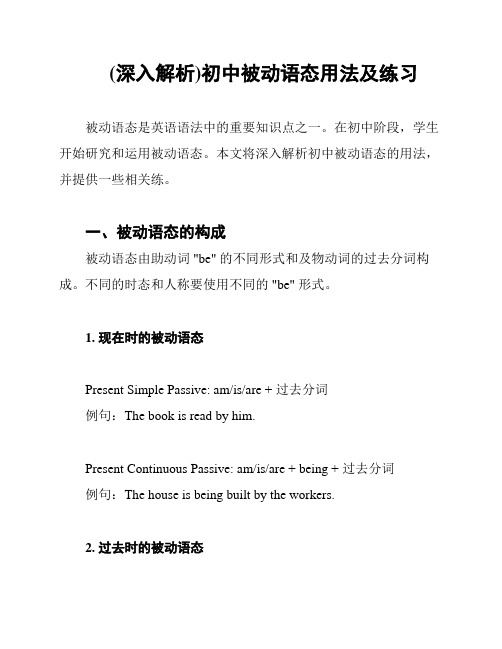
(深入解析)初中被动语态用法及练习被动语态是英语语法中的重要知识点之一。
在初中阶段,学生开始研究和运用被动语态。
本文将深入解析初中被动语态的用法,并提供一些相关练。
一、被动语态的构成被动语态由助动词 "be" 的不同形式和及物动词的过去分词构成。
不同的时态和人称要使用不同的 "be" 形式。
1. 现在时的被动语态Present Simple Passive: am/is/are + 过去分词例句:The book is read by him.Present Continuous Passive: am/is/are + being + 过去分词例句:The house is being built by the workers.2. 过去时的被动语态Past Simple Passive: was/were + 过去分词例句:The letter was sent yesterday.3. 将来时的被动语态Future Simple Passive: will be + 过去分词例句:The job will be done by them.二、被动语态的用法被动语态主要用来强调动作的承受者,或者当我们不知道或不关心动作的执行者时。
在实际应用中,通常通过上下文来确定具体的含义和使用。
1. 强调承受者通过被动语态,我们可以将动作的承受者放在句子的主语位置,以强调承受者。
例句:The bridge was built by the engineer.2. 不知道或不关心执行者有时候,我们并不知道谁执行了动作,或者并不关心动作的执行者。
这时可以使用被动语态。
例句:The window was broken.三、被动语态练以下是一些被动语态的练题,供同学们加深对被动语态的理解和运用。
1. The car ________ by my father. (drive)2. English ________ in many countries. (speak)3. The cake ________ by Mary. (bake)4. The letter ________ to the wrong address. (send)答案:1. is driven2. is spoken3. is baked4. was sent四、总结被动语态是初中英语中重要的语法知识。
(完整版)初中被动语态讲解及练习
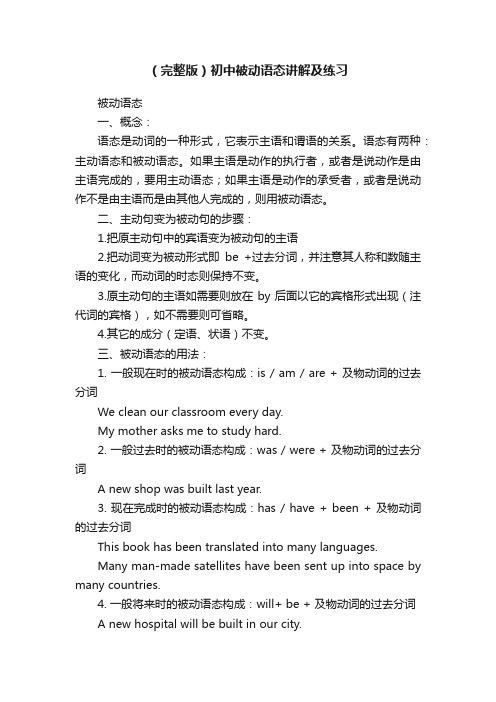
(完整版)初中被动语态讲解及练习被动语态一、概念:语态是动词的一种形式,它表示主语和谓语的关系。
语态有两种:主动语态和被动语态。
如果主语是动作的执行者,或者是说动作是由主语完成的,要用主动语态;如果主语是动作的承受者,或者是说动作不是由主语而是由其他人完成的,则用被动语态。
二、主动句变为被动句的步骤:1.把原主动句中的宾语变为被动句的主语2.把动词变为被动形式即be +过去分词,并注意其人称和数随主语的变化,而动词的时态则保持不变。
3.原主动句的主语如需要则放在by后面以它的宾格形式出现(注代词的宾格),如不需要则可省略。
4.其它的成分(定语、状语)不变。
三、被动语态的用法:1. 一般现在时的被动语态构成:is / am / are + 及物动词的过去分词We clean our classroom every day.My mother asks me to study hard.2. 一般过去时的被动语态构成:was / were + 及物动词的过去分词A new shop was built last year.3. 现在完成时的被动语态构成:has / have + been + 及物动词的过去分词This book has been translated into many languages.Many man-made satellites have been sent up into space by many countries.4. 一般将来时的被动语态构成:will+ be + 及物动词的过去分词A new hospital will be built in our city.Many more trees will be planted next year.5. 含有情态动词的被动语态构成:情态动词+ be + 及物动词的过去分词Young trees must be watered often. Your mistakes should be corrected right now.The door may be locked inside.Your homework can be handed in tomorrow.6. 现在进行时的被动语态构成:am / is / are + being + 及物动词的过去分词7. 不定式的被动语态:to + be + 及物动词的过去分词There are two books to be read.There are twenty more trees to be planted.3. 感官动词或使役动词使用省略to的动词不定式,主动语态中不带to ,但变为被动语态时,须加上to 。
初中英语语法专题讲解——被动语态(无答案)

【趣味词组:1、bookmaker 不一定是图书业者,有可能是接受赌注的庄家2、crow’s feet 不是乌鸦脚,而是鱼尾纹3、green bean 不是绿豆,而是四季豆】被动语态导入:我吃了一个苹果,那现在苹果怎样了?苹果被我吃了。
正如汉语中的被字句,英语中的“被字句”我们称之为被动语态。
英语中有两种语态:主动语态和被动语态。
英语的语态是通过动词形式的变化表现出来的。
一、定义1. 主动语态表示主语是动作的执行者。
例如:Many people speak English. 【谓语:speak的动作是由主语many people 来执行的】2. 被动语态表示主语是动作的承受者例如:English is spoken by many people. 【主语English是动词speak的承受者】He opened the door.他开了门。
(主动句) ------The door was opened.门被开了。
(被动句)二、结构be done1. 一般现在时:am/is/are(not)+doneShe often waters the flowers.The flowers are often watered by her.2. 一般过去时:was/were(not)+doneWe visited a form yesterday.A form was visited yesterday by us.3.一般将来时:will/shall (not)be+donebe going to be doneShe will ask Tom to clean the classroom.→Tom will be asked to clean the classroom by her.4.现在进行时:be+being+done过去进行时:was/ were being doneHe is reading a novel.A novel is being read.5.现在完成时:have/has been+done6.情态动词的被动语态是常考的一个知识点:情态动词(not)+be+过去分词He can speak EnglishEnglish can be spoken by him.三、用法:●不说或者众所周知是谁做时,用被动语态,省略by短语。
- 1、下载文档前请自行甄别文档内容的完整性,平台不提供额外的编辑、内容补充、找答案等附加服务。
- 2、"仅部分预览"的文档,不可在线预览部分如存在完整性等问题,可反馈申请退款(可完整预览的文档不适用该条件!)。
- 3、如文档侵犯您的权益,请联系客服反馈,我们会尽快为您处理(人工客服工作时间:9:00-18:30)。
被动语态的几种特殊用法一、短语动词(“动词+介词/ 副词”、“动词+副词+介词”),如:look after, laugh at, operate on, bring out, give up, put off, do away with, make up for, look down upon 等作谓语,变被动语态时,要把它们看作一个整体,其中的介词或副词不能漏掉。
例如:1. We look after the baby carefully. 我们小心地照看着婴儿。
The baby is looked after carefully.二、感官动词(see, watch, notice, hear, feel 等)和使役动词(let, make, have 等)用在主动句中,要求后面接不带to 的不定式作宾语补足语,但变被动语态时,要加上to 。
因为此时原宾语补足语就变成主语补足语了。
例如:3.I saw the boy play in the street. 我看见男孩在街上玩。
The boy was seen to play in the street.三、带双宾语的句子变被动语态时,如果“直宾”作主语,通常要在“间宾”前加to ,但当谓语动词为make, mend, buy, pay, get, sing, cook, fetch, spare, find 等时,要在“间宾”前加for 。
例如:5. They pass me a letter. 他们递给我一封信。
A letter is passed to me.6. The mother bought her daughter a gift. 那位母亲给她女儿买了一件礼物。
A gift was bought for her daughter.四、带复合宾语(宾语+宾语补足语)的句子,即宾语和宾语补足语都是名词或代词充当的句子,变被动语态时,只能将宾语变为被动语态的主语,而宾补保留在谓语后面。
例如:7. They call the girl Lucy. 他们叫那个女孩露茜。
The girl is called Lucy.五、当anybody, anything 等不定代词作主动式否定句的宾语时,变被动语态时,应将其变为nobody, nothing 作被动句的主语,而把被动句的谓语动词变为肯定形式。
例如:8. He hasn't eaten anything until this morning. 到今天早上为止他什么都没吃。
Nothing has been eaten until this morning.六、有些动词和动词短语是没有被动形式的,也不可用其过去分词作后置定语,如arrive, die, become, disappear, happen, take place, break out, belong to 等。
例如:9. The American Civil War broke out in 1861. 在1861 年美国内战爆发了。
七、当谓语动词为say, report, think, believe, expect, know, consider, suppose 等的句子变被动语态时,有两种形式:A. 用it 作形式主语,而真正的主语用从句的形式来表达,句型为:It is said / reported / supposed / believed that …(据说/ 据报道/ 据推测/ 有人相信……)。
例如:11. People say that he is a doctor. → It is said that he is a doctor. 据说他是个医生。
B. 谓语动词用被动语态,动词不定式作主语补足语。
例如:12. People say that he is a doctor. → He is said to be a doctor.八、主动形式表被动意义的几种情况。
A. read, act, write, feel, sell, wear, wash, open, shout, clean, cook, keep, play, cut, fill, blow, measure, lock, allow, run, record, begin 等,在主语是物的句子里时,常用主动形式表被动意义。
例如:14. This pen writes smoothly. 这支钢笔很好用。
15. The machine runs well. 机器运转良好。
B. 一些表示状态特征的连系动词或一些感官动词,如look, feel, smell, taste, sound, prove, appear 等充当系动词时,用主动形式表被动意义。
例如:16. The roses smell sweet. 玫瑰花闻起来很香。
C. 动词不定式前有形容词light, heavy, easy, difficult, expensive, fit, nice, interesting, dangerous, bitter 等,且与句子主语构成动宾关系时,用主动形式表被动意义。
例如:19. The telephone number “ 119 ” is easy to remember.电话号码119 很好记。
1. The Great Wall ____ all over the world.A. knowsB. knewC. is knownD. was known2. Plays ______ twice a month in that theatre.A. put onB. are put onC. was put onD. often put on3. English ____ in Canada.A. speaksB. are spokenC. is speakingD. is spoken4. This English song___ by the girls after class.A. often singsB. often sangC. is often sangD. is often sung5. Doctors ___ in every part of the world.A. needB. are needingC. are neededD. will need一般过去时1. A strange sound ______ yesterday evening.A. was heardB. hearsC. heardD. is heard2. The People's Republic of China ___ on October 1, 1949.A. foundB. was foundedC. is foundedD. was found3. The bridges___ two years ago.--It's a Haidian top problemA. is builtB. builtC. were builtD. was built4.Jane ___ to sing us an American song last Saturday.A. calledB. was askedC. toldD. was said5. I ___ five minutes to decide whether I should go or not.A. gaveB. was givingC. had givenD. was given6.The boy___ streets without pay in the old days.A. was made to cleanB. made cleanC. made to cleanD. was made clean7. These children____ dance.A. were seen toB. were seen forC. were seenD. saw to8._____ a new library _____ in our school last year?A. Is; builtB. Was; builtC. Does; buildD. Did ; build9.--When ___ this kind of computers______? --Last year.A. did; useB. was; usedC. is; usedD. are; used10.A story _____ by Granny yesterday.A. was told usB. was told to usC. is told usD. told us一般将来时1. The new type of car is going to ______ in three years.A. turn outB. be turned outC. has turned outD. have been turned out2. The key ___ on the table when I leave.A. was leftB. will be leftC. is leftD. has been left3. His new book___ next month.A. will be publishedB. is publishingC. is being publishedD. has been published4. The sports meet ___ be held until next week.A. didn'tB. won'tC. isn'tD. doesn't5. The 2010 World Cup ______ by South Africa.A. is hostedB. is going to hostC. will be hostedD. would be hosted1. Meat _______ out in this shop. We can _________ now.A. have been sold, get nothingB. has been sold, get nothingC. has been sold, get someD. have been sold, get some2 ______ the job ______ by Lucy or by John? Tell me the truth , please.A. Has … finishedB. Has …being finishedC. Is …finishD. Has …been finished3. -I'd like to buy that coat.-I'm sorry. ___.A. it soldB. it's sellingC. It's been soldD. it had been sold4. These papers___ yet.A. have not writtenB. have not been writtenC. has not writtenD. has not been written情态动词1. Old people must ___.A. look after wellB. be looked well afterC. looked well afterD. be looked after well2. Water ______ into ice.A. will changedB. must be changedC. should changeD. can be changed3. My shoes are worn out.A. Can't they be mended?B. Let me have a look at it.C. How much do they cost?D. Can't they mended?4. The flowers___ often.A. must be waterB. must be wateredC. must wateredD. must water5. The books may___ for two weeks.A. be keptB. be borrowedC. keepD. borrow6. The broken bike____ here by Mr Smith.A. can mendB. can mendedC. can be mendD. can be mended7. Our room must ___ clean.A. keepB. be keptC. to be keptD. to keep例外1. He fell from his bike and ___.A. is hurtB. gets hurtC. got hurtD. hurt2. You___ more beautiful in the light blue shirt.A. seeB. watchC. lookD. look at3.What you said ___. like a good idea.A. heardB. listenedC. soundD. sounded4. What do you think of the TV play?-Wonderful. It is worth___ a second time.A. watchingB. watchedC. seenD. seeing5. How dirty the tables are! They need___.A. to cleanB. cleanC. cleaningD. cleaned6. Great changes___ in the past ten years in China.A. took placeB. have taken placeC. were taking placeD. had taken place7. You can't use the computer, it____.A. was broken downB. is wrongC. is badD. has broken down8. These stones___ well.A. are fittedB. fitC. fitsD. is fitted9. The bike ___ 500 yuan.A. was costB. costedC. costD. is costed10. -Do you like the skirt ? -It _______ soft.A. is feelingB. feltC. feelsD. is felt二、用括号内所给动词的正确形式填空。
